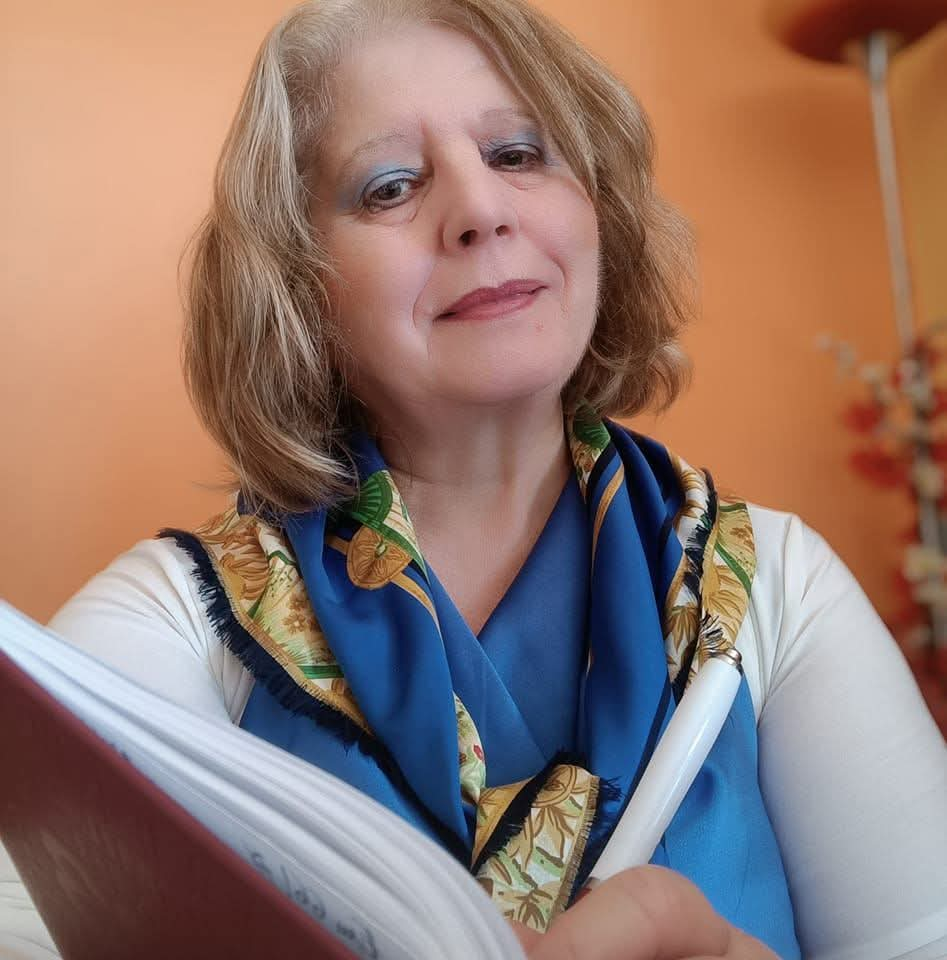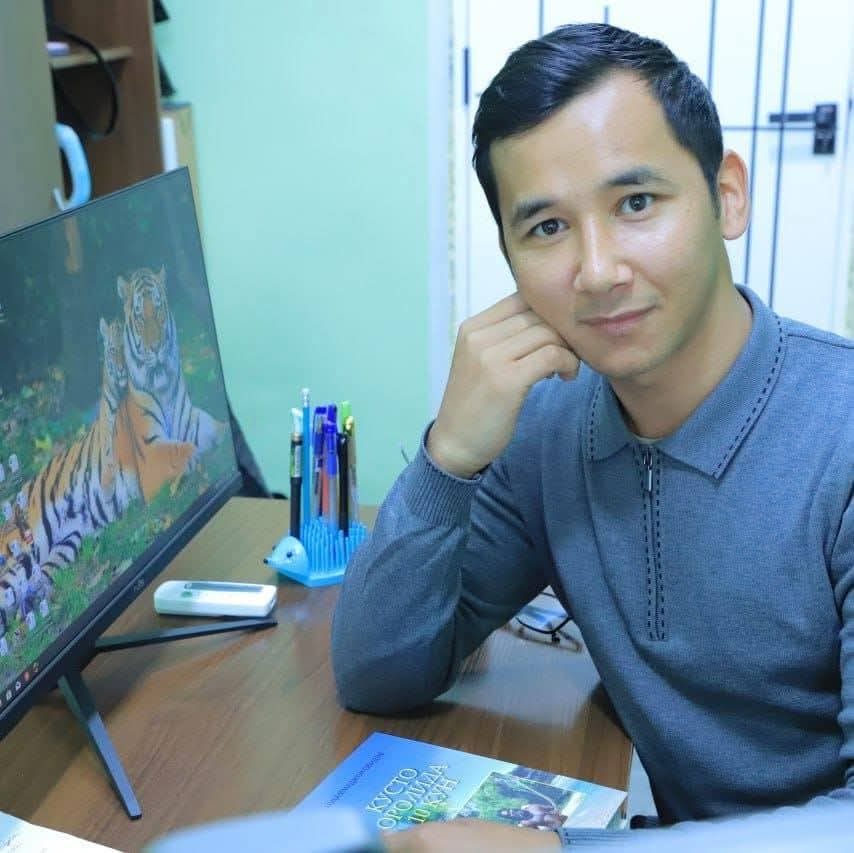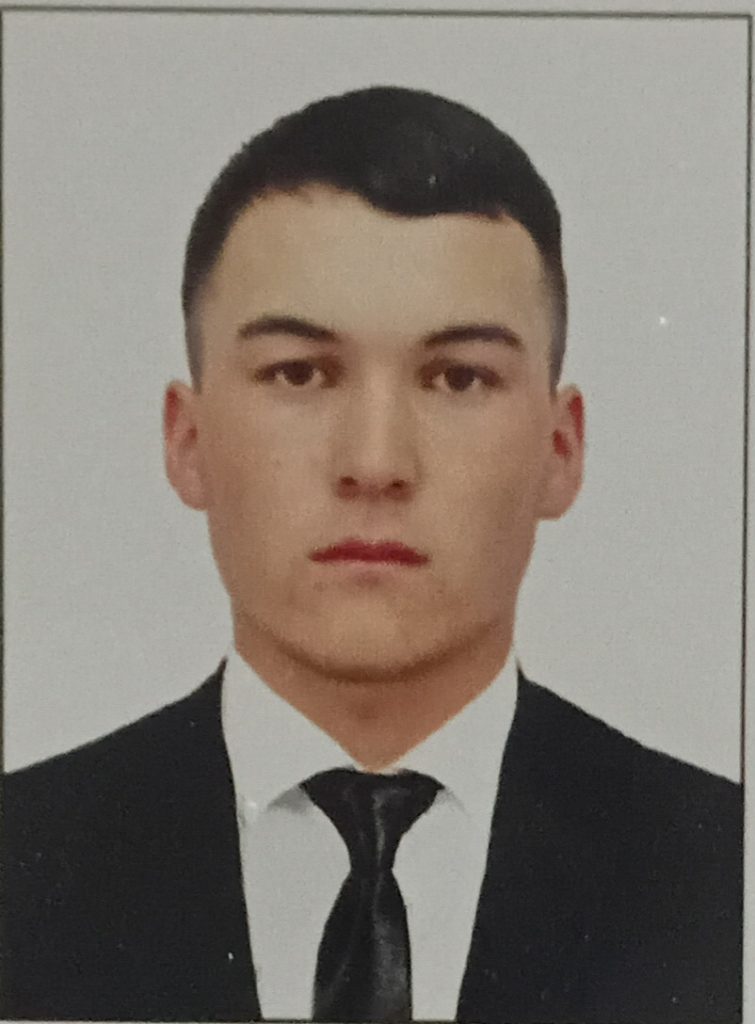

“TIME ITSELF IS THE FAIREST EDITOR”
Today’s guest is the distinguished young Uzbek poet, journalist, and translator Jakhongir Nomozov — a member of the Azerbaijan Journalists’ Union and the World Union of Young Poets, the Uzbekistan correspondent for Azerbaijan’s “Butov Azerbaijan” newspaper, a recipient of numerous international literary awards, and a devoted promoter of literature and cultural dialogue.
E. M: Esteemed Jakhongir, do you tell us about the beginning of your passion for the literary arts and where your first inspirations originated?
J. N: I believe that every human has an innate inclination and inner need for literature and art. For some, this need awakens early; for others, it emerges through certain life trials. For me, love for literature was strong from childhood. Nature, goodness, love — these are my main sources of inspiration. Rivers, sometimes calm, sometimes rushing; the infinite sky — all of these turned into poetry in my soul. Innocent childhood memories, the highs and lows of life, joys and pains — all shaped me not only as a poet but also as a human. Poetry is not a chosen profession for me, but an inner necessity, a spiritual need.
E. M: Is literature becoming a closed system where the “original voice” matters less than the right connections?
J. N: A very painful yet important question… Unfortunately, history shows that true talents are not always appreciated in their time. Many great creators were ignored during their lives, and their worth was recognized only after death. This bitter truth remains relevant today. In contemporary literary circles, sometimes a work’s inner power, artistic depth, or spiritual weight is overshadowed by the author’s family name, status, or connections. This makes the path harder for talented creators without influential support, slowing their voice. Yet, I still believe in the justice of words. True words withstand the test of time. A work unrecognized today will find its reader tomorrow. Literature is a marathon, not a sprint. The most important thing for a poet or writer is conscience and sincerity. Connections may give temporary advantage, but talent is eternal.
E.M: Is literature becoming a closed system where the “original voice” matters less than the right connections?
J. N: Partially, unfortunately, yes. Today, in some literary spaces, it seems that who opens the door matters more than the voice itself. This contradicts literature’s natural laws, as literature has never thrived in isolation — it always feeds on the hearts of the people.
Yet, I firmly believe that literature’s true domain can never be fully closed. It finds its voice through invisible paths. Even if platforms are closed today, time is the most just editor. A creator with a true voice will eventually be heard, because fake connections crumble, but genuine words endure.
E.M: How can an emerging author, lacking establishment support, break the wall of editorial indifference?
J.N: First of all, a young writer must not lose their inner independence. Editorial indifference is often not due to lack of talent, but fear of a bold voice, since new ideas always disrupt comfort. A new creator must understand that every rejection is not a stop sign but a direction marker. If one door closes, find another. Today, digital space, translations, international platforms, and independent publishing exist.
E. M: Is there a risk that this familiarity will lead to a homologation of style, punishing those who dare to innovate?
J. N: Certainly, the danger exists. In environments dominated by connections, courage is punished and flatterers rewarded. Consequently, literature can become a mechanical organism instead of a living being. Yet, history shows that the greatest literary breakthroughs came precisely from “incompatible,” “unsuitable,” and “uncomfortable” voices.
Stylistic uniformity may create temporary calm, but innovation always breaks through that calm. I believe true creators fear neither punishment nor recognition; their courage is measured by inner truth.
E. M: Why is art often seen today as a “hobby” and not as a profession that requires sacrifice?
J. N: Today, the world measures productivity by speed and value by profit. Art, especially literature, is seen as less “serious” because it does not immediately generate financial gain. Yet art is one of the most complex and responsible forms of human labor. Behind every line of a poet are years of accumulated knowledge, spiritual struggle, inner conflict, and moral responsibility. History shows us: Dostoevsky lived in debt, Kafka’s works went largely unnoticed in his lifetime, Van Gogh sold only one painting. They treated art not as a hobby, but as a matter of life and death. Today, the question “How do you earn?” shows a lack of understanding, not a denial of art.
E.M: In a world of “quick numbers,” have we lost the ability to recognize slow talent, the one that takes time to understand?
J.N: Unfortunately, yes. Today, talent is often measured by visibility: views, likes, quick spread. True talent does not always appear instantly; it often matures in silence.
Literary history gives many examples: Navoiy’s works were not written for a single day’s hype, Kafka and Borges were not overnight successes. Understanding their works requires time, preparation, and inner maturity. Today’s “fast-number” culture sidelines complex, slowly digested works. As a result, society is accustomed to quick consumption, which dulls discernment. Recognizing talent is not algorithmic; it’s a matter of cultural literacy.
E. M: What is the impact of digital gratuity on the perception of the value of literary work?
J.N: Digital free distribution is a double-edged sword. On one hand, it democratizes access: a young poet in a remote area can share their voice globally. That is positive. On the other hand, “everything is free” devalues literary labor. Texts become mere consumable content, read and forgotten. The work of a creator over years can feel equal to a single post. Literature demands not speed, but contemplation. If society forgets the value of time and effort, art becomes shallow.
E.M: Can a society call itself civilized if it doesn’t invest in less commercial but more visionary creative minds?
J.N: No, such a society cannot be called cultured. Culture is not today’s profit, but tomorrow’s future. If society supports only quickly consumable products, it trades its future for short-term gain.
E. M: The creative today must also be a “marketing expert”: how much does this take away from pure creation?
J.N: Creativity requires inner calm and concentration. If a poet or writer thinks about “how many likes” rather than their own words, their creative world becomes conditional and artificial. Shakespeare never worried about audience numbers; his world was linked to characters, words, and spirit. Today, algorithms favor short, digestible, viral content, pressuring creators to bypass their inner voice. The result: artistic depth declines, spiritual sincerity weakens. Yet, if a creator remains true to their voice, marketing is only a tool, not a master.
E. M: Is social media really atrophying the public’s ability to read complex works like novels or poetry collections?
J.N: Yes, social networks can weaken the ability to read complex works like novels or poetry collections. They encourage rapid consumption, shifting attention to short blocks.
Multi-layered works demand attention, patience, and internal rhythm, which social media reduces. Yet, these platforms can also attract new audiences. A young reader may discover a full book after seeing a short excerpt online. Thus, social media can both empower and weaken, depending on conscious engagement.
M. E: Is the algorithm the new literary critic?
How does it influence what we write?
J.N: Yes, algorithms have become an “uncertain critic,” shaping literary taste. They favor short, easily read, and widely spread texts. Creators may lose their personal voice, adapting to algorithmic rules. Instagram poems or Twitter micro-thoughts gain visibility, but complex philosophical works appear lower. This creates internal pressure: “what should I write?” An algorithm is not a critic; it is an interest gauge. True literary critique depends on time, philosophy, context, and depth. Adapting to algorithms increases visibility, not artistic truth.
E. M: Digital Ego Fragility: How Does Like Addiction Undermine Writers’ Resilience?
J.N: Likes, reposts, follows are stimulants for today’s creators but make the ego fragile. If a writer ties their value to external approval, rejection triggers depression, doubt, and creative blocks.
A young poet expecting 1000 likes but receiving 100 may feel inadequate. Motivation then becomes artificial, prioritizing likes over genuine voice.
E. M: Imposter Syndrome: How Much Does Comparison Affect the (Often Apparent) Success of Others?
J.N: Imposter syndrome forces creators to undervalue themselves. Comparing to famous writers can intensify internal critique, blocking creative flow. Creators must follow their own path and voice.
E. M: Does hyper-connection prevent us from finding the inner silence necessary for great writing?
J.N: Constant connectivity and rapid information flow disrupt inner calm, necessary for great literature. Complex philosophical works require deep thought and concentration.
E. M: Are fear of offending or “cancel culture” limiting the authors’ sincerity?
J. N: Yes, fear of offending or “cancel culture” limits sincerity. Creators restrict themselves, weakening creative honesty. True literature must remain free; self-censorship makes it artificial.
E.M: What impact have organizations like “World Talents” and “World Union of Young Turkish Writers” had on its growth?
J. N: These organizations not only provided a platform, but also expanded my spiritual space.
Every creator gains energy from attention, recognition, and encouragement; I too was inspired. Such external support fuels my future successes. Creativity cannot be measured by awards or membership; it is measured by the rise of thought, imagination, worldview, and finding one’s full voice. These experiences enriched my work, broadened my perspective, and shaped my voice.
E. M: What differences do you have between your role for “Butov Azerbaycan” and the Turkish magazine “SIIR SARNICI”?
J.N: Both serve the same goal: strengthening literary ties, promoting intercultural harmony and friendship — the main mission of my creative life. Through this, not only do connections form, but each creator finds a chance to share their voice globally.
E. M: Which of her many journalistic and literary affiliations was the most significant to her?
J.N: Each of my journalistic and literary roles opened a door to my heart. Most importantly, international projects allowed me to engage with people sincerely as a poet and journalist. Creativity and journalism exist not in solitude but as bridges between humans. This feeling makes all my roles meaningful.
E. M: He has received prestigious awards such as the “Abay” Medal and the “Guzel Alania Award”. Which of these has the deepest meaning for her?
J.N: Among prestigious awards, the “Abay” medal holds the deepest spiritual meaning. Abay symbolizes humanity, knowledge, philosophy, and literature. This award reminds me: creativity is not merely wordcraft, but enriching the human spirit. The “Guzel Alania Award” honors international recognition and dialogue, making both important, yet the Abay medal touches the heart most deeply.
E. M: How did your vision influence the “Amir Temur Fund Commemorative Badge”?
J.N: The “Amir Temur Memorial” inspired me profoundly. Temur represents not just empire-building, but a center of culture and spirit. This award is not just recognition, but dialogue with history and values. I aim to remain a creator true to myself, inspired but not imitating historical figures.
E.M: Tell us about his books: “Rebels in My Heart,” “Sacred Space,” and “Song of Awakening.” What themes unite them?
J. N: My books share themes of love, humanity, spiritual awakening, and the pure voice of the heart.
They are guides in the journey of self-discovery, not mere stories.
E. M: Does he change his creative approach between poetry, journalism and translation?
J.N: Poetry, journalism, and translation complement each other. Poetry expresses inner states; journalism develops observation and analysis; translation opens doors to other hearts, building bridges between languages and cultures.
The principle is always the same: sincerity and fidelity to one’s inner voice.
E. M: If he had to choose only one field of action for the rest of his life, which one would he choose?
J.N: If I had to choose one path for life, I would choose poetry. Poetry is the purest, truest, most beautiful expression of the human heart. Journalism and translation are valuable tools, but poetry awakens the soul and nourishes the heart. A single line can contain a whole world, history, and future aspiration.
E.M: His connection to Azerbaijan and patriotism: how does this theme shape his work?
J.N: Though I never lived in Azerbaijan, I feel close to its history, culture, literature, and people. Patriotism in my work coexists with universal human values. Literature and love know no borders.
E. M: At the end of this dialogue, what advice and messages would Jakhongir like to leave to those who read his thoughts, so that they can be welcomed as seeds of peace in the soul?
J.N: I want to tell readers: every word can plant a seed in the heart. Plant it with love, sincerity, and honesty. If seeds of peace, love, and conscience grow, the world responds in kind. Each person’s inner world is a garden. Nurture it with books, poetry, art, and sincere dialogue. Most importantly, preserve humanity; spread love and let your inner voice always remain true. Through that voice, humanity preserves its peace, culture, and future.
Interview conducted by: Elisa Mascia




